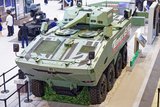Germany upgrades Puma IFVs
The Puma IFV was first introduced into German Army service in 2015. (Rheinmetall)
Work has started on an upgrade to the German Armed Forces fleet of Puma Infantry Fighting Vehicles (IFVs) upgraded to a new S1 standard to prepare them for high-intensity conflict.
German company Rheinmetall has initiated the upgrade programme this month following a contract award worth €1.04 billion ($1.23 billion) signed on 28 June 2021 between the JV company PSM (a Rheinmetall/KMW 50:50 consortium) and defence procurement agency BAAINBw.
The order is for an initial batch of 154 vehicles. A spokesperson from Rheinmetall told Shephard that deliveries under this first order would be completed by 2026. The contract contains options to upgrade another
Already have an account? Log in
Want to keep reading this article?
More from Land Warfare
-
![US DoD task force’s DroneHunter acquisition lays groundwork for Replicator 2 CUAS strategy]()
US DoD task force’s DroneHunter acquisition lays groundwork for Replicator 2 CUAS strategy
As the US Department of Defense looks to counter the growing threat of uncrewed aerial systems to improve homeland security, the DroneHunter acquisition could point to future commercial innovation.
-
![Norway opts for Hanwha’s Chunmoo for long-range fires under $2 billion deal]()
Norway opts for Hanwha’s Chunmoo for long-range fires under $2 billion deal
The selection of Hanwha’s K239 Chunmoo long-range precision fires system, with a contract expected to be signed on 30 January, makes Norway the second European country to choose the system. It is expected an operational system will be in service within four years.
-
![Land forces review: Tanks, trucks and IFVs dominate but woes remain for Ajax]()
Land forces review: Tanks, trucks and IFVs dominate but woes remain for Ajax
This year has begun with main battle tanks taking the lead while orders for large logistics and support vehicles continued from last year. Additionally, two of the British Army’s most significant contracted vehicle programmes, Ajax reconnaissance vehicle and Challenger 3 tank, continued to make news in January.























